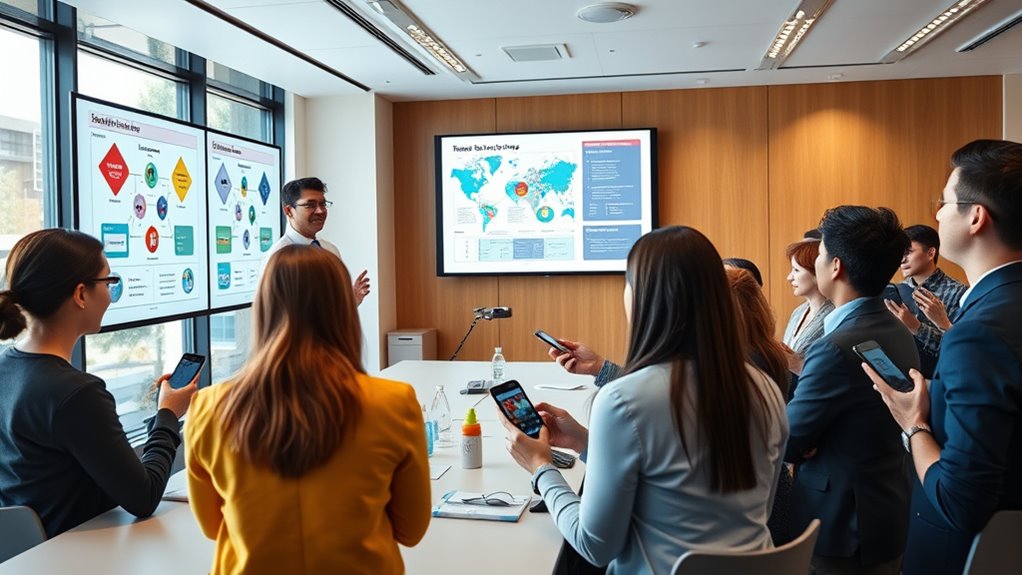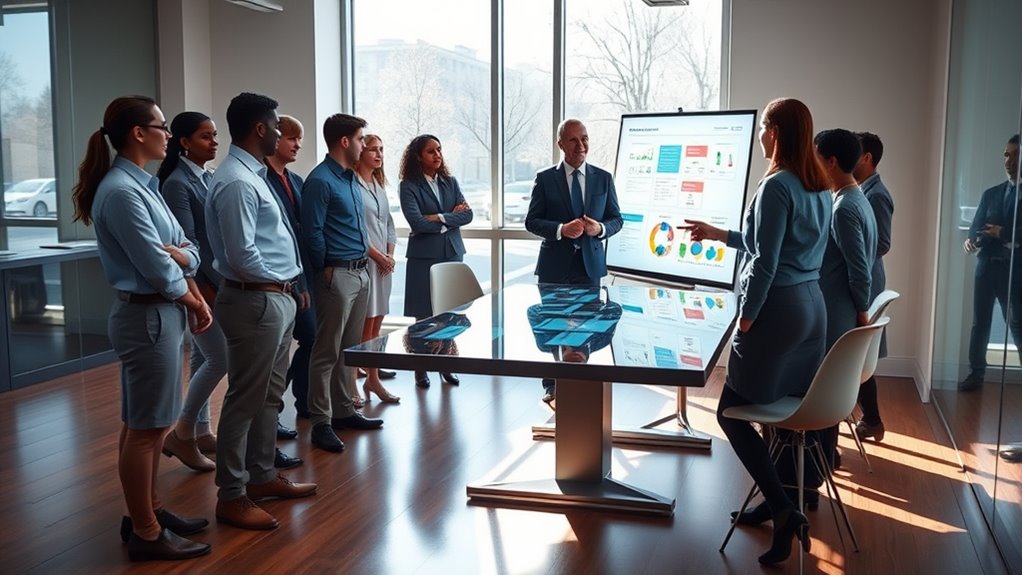To train staff for exceptional mobile service, focus on evaluating their current skills, setting measurable goals, and creating engaging, interactive training that covers troubleshooting, device repair, app management, and security protocols. Incorporate hands-on practice, scenario-based role-plays, and ongoing education to keep skills sharp. Emphasize customer empathy, clear communication, and responsiveness. Continuously gather feedback and monitor performance to refine your approach—keep going to discover how to build a truly customer-centric team.
Key Takeaways
- Develop comprehensive, modular training programs focusing on troubleshooting, device repair, and app integration for practical skills.
- Incorporate ongoing education on security protocols, legal compliance, and industry standards to ensure up-to-date expertise.
- Enhance customer service through empathy training, active listening, and effective communication strategies.
- Use interactive methods like role-playing, simulations, and gamified modules to reinforce learning and build confidence.
- Regularly assess staff performance using feedback, metrics, and certifications to promote continuous improvement and exceptional service.
Assessing Training Needs and Setting Goals

Before designing an effective training program, you need to identify what your staff truly needs to excel in mobile service. Start by evaluating their current skills in mobile device troubleshooting, pinpointing specific gaps that could affect customer satisfaction. Consider how well your team understands regulatory compliance, as failure to adhere can lead to legal issues and fines. Set clear, measurable goals based on these needs, such as reducing troubleshooting time or improving compliance knowledge. This helps ensure your training is targeted and effective. By understanding where your staff currently stands, you can prioritize areas that will make the biggest impact on service quality and compliance. Additionally, understanding the regulatory environment related to mobile services can help you develop more comprehensive training programs. Conducting regular assessment and feedback sessions can further refine training efforts to keep pace with evolving regulations and technologies. Staying updated on latest industry standards ensures your team remains compliant and knowledgeable. Regularly reviewing training effectiveness and adjusting strategies accordingly can lead to continuous improvement. Incorporating industry-specific regulations into your training modules ensures your staff is fully prepared to meet legal requirements. Accurate assessment and goal-setting lay a solid foundation for a successful training program.
Developing a Comprehensive Training Program

To develop an effective training program, you need to focus on solid curriculum design strategies that engage your staff and address their specific needs. Incorporating practical skill development guarantees your team can confidently handle real-world mobile service scenarios. By carefully planning these elements, you create an extensive program that boosts both competence and customer satisfaction. Regularly assessing and organizing training sessions ensures continuous improvement and adaptation to evolving service demands. Incorporating color accuracy principles can also help improve the clarity and reliability of visual information used during training, leading to better understanding and retention. Additionally, understanding store hours can help staff advise customers more effectively about shopping times and product availability, enhancing overall service quality. Including nutritional information can further assist staff in providing detailed product descriptions, especially when dealing with health-conscious consumers. Integrating sound healing science principles can also help reduce staff stress and improve team cohesion, leading to a more effective training environment.
Curriculum Design Strategies
Designing an effective training program begins with clearly identifying the skills and knowledge your staff need to deliver exceptional mobile service. Focus on core areas like mobile app tutorials and device troubleshooting. To structure your curriculum, consider these strategies:
| Strategy | Description |
|---|---|
| Needs Assessment | Identify gaps in staff knowledge and skills |
| Modular Content | Break training into manageable, focused modules |
| Interactive Learning | Use hands-on activities and simulations |
| Continuous Updates | Keep content current with software and device changes |
This approach guarantees your team develops proficiency in essential areas, enabling them to handle customer queries confidently and efficiently. Tailoring your curriculum with these strategies will help you create a detailed, engaging training program that meets your mobile service standards. Incorporating ongoing education ensures your staff stay updated with the latest industry trends and technical advancements. Additionally, emphasizing cybersecurity awareness within the training can help protect customer data and reduce vulnerabilities. Including best practices related to safety and security will further enhance the quality of your mobile service delivery. Recognizing the importance of emotional support can also foster a more empathetic approach to customer interactions, improving overall satisfaction. To ensure the effectiveness of your training, regularly evaluate and update your curriculum based on feedback from staff and customers.
Practical Skill Development
Developing a thorough training program requires focusing on practical skill development that translates directly to improved customer service. You need hands-on experience in mobile app troubleshooting, so staff can quickly identify and resolve app issues. Incorporate real-world scenarios that challenge staff to diagnose problems efficiently. Additionally, emphasize device repair techniques, covering common hardware issues and safe repair methods. Use interactive workshops and simulations to reinforce these skills, ensuring your team can handle repairs confidently and accurately. Regular practice sessions help staff stay sharp and adapt to new technologies. To maintain the quality of repairs, training should include guidance on storing essential oils safely and effectively, which can serve as a useful analogy for handling delicate components. Furthermore, understanding regional legal resources can help staff advise customers on related concerns or direct them to appropriate assistance when needed. Incorporating best practices for preventing hardware damage can significantly reduce repair times and improve customer satisfaction. Moreover, providing training on privacy policies ensures staff are aware of data handling and confidentiality, fostering trust with customers. By honing these practical skills, your team becomes more self-sufficient and capable of delivering prompt, effective solutions, ultimately elevating the customer experience and building trust in your mobile service offerings.
Mastering Mobile Devices and Technologies

Mastering mobile devices and technologies is essential for providing exceptional service in today’s fast-paced environment. You need to understand mobile device security thoroughly to protect sensitive customer data and prevent breaches. Make sure staff can identify potential security threats and implement best practices, like strong passwords and encryption. App integration is equally important; your team should seamlessly connect various applications to streamline workflows and improve efficiency. Familiarity with device settings, operating systems, and app troubleshooting helps deliver quick, effective support. Regular training ensures staff stay updated on the latest technologies and security protocols. Staying informed about machine learning advancements can help your team leverage emerging tools to enhance service quality and operational efficiency. Additionally, understanding angel numbers can provide insights into positive changes and growth opportunities in your service strategies. To further enhance security, training on mobile device security protocols is crucial for maintaining customer trust. When your team masters these skills, they’ll confidently handle mobile devices, enhance operational productivity, and deliver reliable, secure service to customers. Incorporating comprehensive security awareness into ongoing education ensures staff are prepared for evolving threats and can protect both your organization and your clients effectively. Developing skills in mindfulness techniques can also help staff maintain focus and reduce stress during busy service hours, improving overall performance.
Enhancing Customer Service Skills

To improve your customer service, focus on sharpening your communication skills and actively listening to what customers say. Developing empathy helps you connect better and address their needs more effectively. By mastering these techniques, you’ll create a more positive and responsive mobile service experience.
Effective Communication Techniques
Effective communication is the cornerstone of exceptional customer service, especially in a mobile environment where interactions are often quick and remote. To guarantee your message resonates, focus on tone modulation and recognizing non-verbal cues, even in a virtual setting. Your tone can convey empathy, confidence, and clarity, making customers feel valued. Remember these key techniques:
- Use a warm, friendly tone to build rapport quickly.
- Vary your pitch and pace to emphasize important points.
- Pay attention to non-verbal cues like pauses or silence that signal customer concerns.
Active Listening Strategies
Active listening is essential for delivering outstanding customer service, especially in a mobile environment where customers seek quick and accurate support. To do this effectively, pay attention to non-verbal cues like tone of voice and pauses, which reveal customer emotions. Show active engagement by summarizing what they say and asking clarifying questions. This exemplifies you’re genuinely listening and understanding their needs. Encourage a two-way flow of information with open-ended questions. Use the table below to identify key active listening strategies:
| Strategy | Purpose |
|---|---|
| Observe non-verbal cues | Gauge customer emotions and reactions |
| Paraphrase customer | Confirm understanding and engagement |
| Ask open-ended questions | Promote active engagement and clarity |
| Provide verbal affirmations | Show attentiveness and reassurance |
Mastering these techniques boosts customer satisfaction and loyalty.
Empathy Development Methods
Building on your active listening skills, developing genuine empathy allows you to connect more deeply with customers. To enhance your emotional intelligence, try empathy exercises like imagining yourself in their situation or reflecting on their feelings. These practices help you better understand customer needs and build trust. Here are three effective empathy development methods:
- Practice active empathy exercises daily to strengthen emotional awareness.
- Role-play customer scenarios to improve your response to emotional cues.
- Seek feedback from peers to identify areas for emotional intelligence growth.
Practical Role-Playing and Scenario-Based Training

Practical role-playing and scenario-based training immerse staff in real-life situations, allowing you to build confidence and sharpen your skills. By engaging in role reversal, you see both customer and staff perspectives, fostering understanding and empathy. Scenario improvisation challenges you to think on your feet, adapting quickly to unexpected issues. This hands-on approach helps you practice handling difficult conversations, troubleshooting, and providing personalized solutions. It encourages active learning and immediate feedback, which reinforce best practices. Recreating realistic mobile service scenarios ensures you’re prepared for a variety of situations. Through repeated practice, you’ll develop a natural, professional response that enhances customer satisfaction and trust. Overall, this training method makes you more adaptable, confident, and capable of delivering exceptional service.
Utilizing Technology for Interactive Learning

Integrating technology into your training sessions transforms traditional role-playing into dynamic, engaging learning experiences. AR simulations put your staff in realistic scenarios, allowing them to practice skills in a safe, immersive environment. Gamified modules turn learning into a fun challenge, encouraging active participation and motivation. To maximize impact, focus on these key approaches:
- Use AR simulations to replicate real-world customer interactions for hands-on practice.
- Incorporate gamified modules to reinforce learning through competitions and rewards.
- Leverage technology to track progress and identify areas needing improvement.
Continuous Learning and Skill Refreshment

To guarantee your staff maintains top-tier mobile service, ongoing learning and skill refreshment are essential. Encourage peer mentorship, where experienced team members guide newer staff, fostering continuous development and knowledge sharing. Supporting your team in obtaining industry certifications keeps their skills current and demonstrates your commitment to excellence. Regularly scheduled training sessions, workshops, or online courses ensure your staff stays updated on the latest technology trends and customer service techniques. By cultivating a culture of continuous learning, you motivate your team to grow professionally and stay engaged. This approach not only improves service quality but also boosts confidence and job satisfaction, creating a more competent, adaptable workforce ready to meet evolving customer needs.
Measuring Training Effectiveness and Feedback

Evaluating the effectiveness of your training programs is essential to ensuring your staff’s skills translate into improved service. To do this, you should focus on collecting meaningful feedback and analyzing performance metrics. Feedback surveys allow you to gauge employee perceptions and identify areas needing improvement. Performance metrics, such as customer satisfaction scores or resolution times, provide quantitative data on how well staff apply their training. Remember these key points:
Measuring training success through feedback and performance metrics ensures continuous service improvement.
- Regularly administer feedback surveys after training sessions.
- Track performance metrics consistently to measure progress.
- Use insights from surveys and metrics to refine your training approach.
Fostering a Customer-Centric Service Culture

Creating a customer-centric service culture starts with leadership setting clear expectations and modeling the behaviors they want to see. You should emphasize the importance of mobile app updates, ensuring your team understands how timely updates improve user experience and trust. Prioritize data security, showing staff how to protect customer information at every touchpoint. To illustrate, consider this table:
| Customer Focus Area | Action Example |
|---|---|
| Mobile app updates | Promptly communicate updates to users |
| Data security | Follow protocols to safeguard info |
| Responsiveness | Address issues quickly |
| Transparency | Clearly explain app changes |
| Empathy | Listen and respond genuinely |
Frequently Asked Questions
How Can Staff Stay Updated With Rapidly Changing Mobile Technologies?
To stay updated with rapidly changing mobile technology, you need to prioritize ongoing staff training. Keep an eye on industry news, attend workshops, and participate in webinars focused on mobile tech advancements. Encourage your team to explore new tools and features regularly. By fostering a culture of continuous learning, you guarantee your staff remains knowledgeable, adaptable, and ready to deliver exceptional mobile service, keeping your business competitive in this fast-evolving landscape.
What Strategies Promote Consistent Customer Service Quality Across Teams?
To promote consistent customer service quality across teams, you should implement standardized protocols that everyone follows. This guarantees uniformity in how staff handle customer interactions. Foster team cohesion by encouraging open communication and teamwork, which helps staff support each other and share best practices. Regular training and feedback sessions reinforce standards, creating a unified approach that enhances overall service quality and customer satisfaction.
How to Handle Challenging Customer Situations Effectively via Mobile Service?
When handling challenging customer situations via mobile service, you should prioritize empathy training to understand their concerns genuinely. Use conflict resolution skills to de-escalate tensions, remaining calm and patient. Listen actively, acknowledge their feelings, and offer clear solutions. By staying empathetic and employing effective conflict resolution techniques, you can turn difficult interactions into positive experiences, strengthening customer trust and loyalty, even in tough situations.
What Are the Best Practices for Remote or On-The-Go Staff Training?
Imagine empowering your team while they’re on the move—this is where virtual coaching and mobile workshops shine. You should leverage real-time remote training, offering flexible, interactive sessions that adapt to their schedules. Use mobile-friendly platforms, keep content engaging, and provide instant feedback. By doing so, you foster continuous growth, boost confidence, and guarantee your staff delivers exceptional service, whether they’re in the field or at their desks.
How Can Feedback Be Used to Personalize Ongoing Staff Development?
You can use feedback to personalize ongoing staff development by creating feedback loops that identify individual strengths and areas for improvement. Incorporate personalized coaching based on this feedback, tailoring training to each team member’s needs. Regularly gathering and acting on feedback allows you to adapt your approach, ensuring continuous growth. This targeted method boosts engagement and skill development, making your staff more effective and confident in their roles.
Conclusion
By investing in thorough training, you’ll turn your staff into mobile service maestros, ready to handle any challenge with the agility of a circus juggler. Remember, continuous learning keeps skills sharp like a samurai’s blade, ensuring your team stays ahead in this fast-paced tech age. Embrace every training session as an opportunity to sharpen your team’s skills, much like a blacksmith forging excellence. With dedication, you’ll deliver service that’s truly exceptional—no DeLorean needed!









